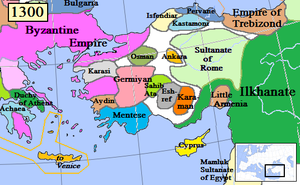- Mesud II
-
Masud II or Mas'ud II (Arabic: غياث الدين مسعود بن كيكاوس, Ghīyāth al-Dīn Mas'ūd bin Kaykā'ūs) bore the title of Sultanate of Rum at various times between 1284 and 1308. He was a vassal of the Mongols and exercised no real authority. History does not record his ultimate fate.
Masud II was the eldest son of Kaykaus II. He spent part of his youth as an exile in the Crimea and lived for a time in Constantinople, then the capital of the Byzantine Empire. He appears first in Anatolia in 1280 as a pretender to the throne. In 1284 the new Ilkhan Sultan Ahmad deposed and executed the Seljuq sultan Kaykhusraw III and installed Masud in his place. Ahmad’s successor, Arghun, divided the Seljuq lands and granted Konya and the western half of the kingdom to the deposed sultan’s two young sons. Masud invaded with a small force, had the two boys killed, and established himself in the city in 1286.
He led several campaigns against the emerging Turkmen principalities, the Beyliks, always on behalf of the Mongols and usually with Mongol troops. Notable among these is the expedition beginning late in 1286 against the Germiyanids. The Germiyanids were a warlike band, possibly of mixed Kurdish and Turkmen ancestry, settled by the Seljuqs a generation before in southwestern Anatolia to keep the more unruly Turkmen nomads in check. Masud conducted the campaign under the tutelage of the vizier and elder statesman, Fakhr al-Din Ali. Though there were a few successes on the battlefield, the highly mobile Germiyanids remained a significant force in the region. Masud and his Mongol allies conducted similarly futile expeditions against the Karamanids and Eshrefids.
In 1297 in an atmosphere characterized by intrigue and near constant revolt against the distant Ilkhan authority, both on the part of Mongol officers and local Turkmen potentates, the hapless Masud was implicated in a plot against the Ilkhanate. He was pardoned but deprived of his throne and confined in Tabriz. He was replaced with Kayqubad III who soon became involved in a similar plot and was executed by Sultan Mahmud Ghazan. The impoverished Masud returned to the throne in 1303.
From about 1306 Masud, and the Seljuq Sultanate with him, disappears from the historical record.
Sources
- Claude Cahen, Pre-Ottoman Turkey: a general survey of the material and spiritual culture and history, trans. J. Jones-Williams, (New York: Taplinger, 1968) 294-301.
External links
- Prof. Dr. Mehmet Eti. Examples of coinage in Masud's name: "Seljuk numismatics". http://mehmeteti.150m.com/seljuqsofrum/masudII.htm Examples of coinage in Masud's name:.
Preceded by
Kaykhusraw IIISultan of Rûm
1284–1296Succeeded by
Kayqubad IIIPreceded by
Kayqubad IIISultan of Rûm
1303-1307Succeeded by
Office abolishedSeljuq Sultans of Rum (1077–1307) Kutalmish · Suleiman I · Abu'l Qasim (self-declared) · Kilij Arslan I · Malik Shah · Mesud I · Kilij Arslan II · Kaykhusraw I · Suleiman II · Kilij Arslan III · Kaykaus I · Kayqubad I · Kaykhusraw II · Kaykaus II · Kilij Arslan IV · Kayqubad II · Kaykhusraw III · Mesud II · Kayqubad III
Categories:- 13th-century births
- 14th-century deaths
- Sultans of Rum
- Pardon recipients
Wikimedia Foundation. 2010.

